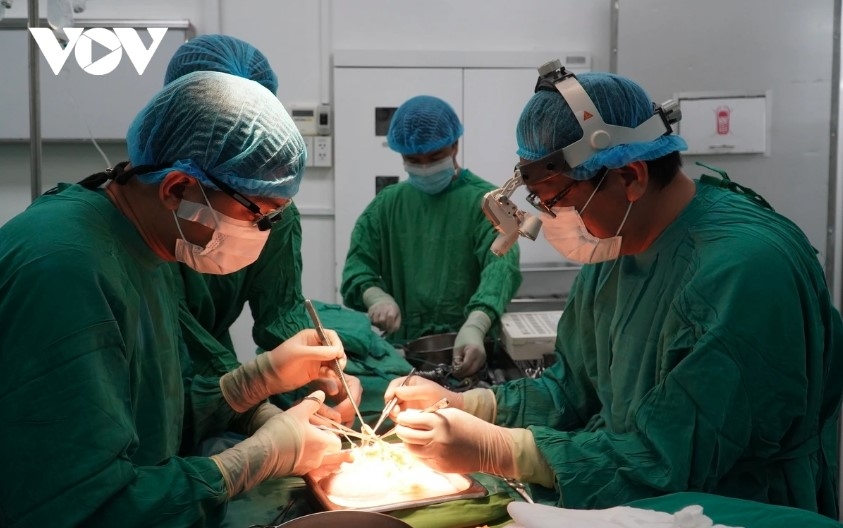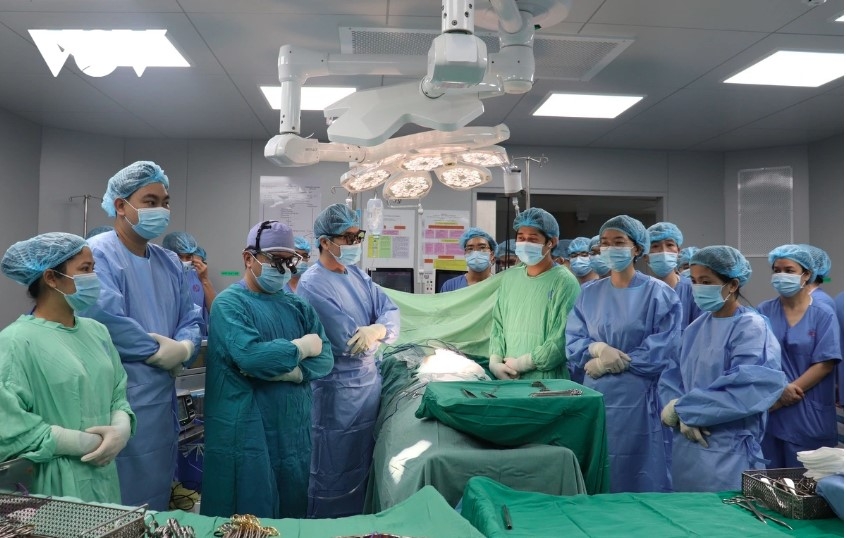Vietnam’s organ transplantation achievements and donor shortage concerns
VOV.VN - The year 2024 marked remarkable advancements in Vietnam’s organ transplantation sector, both in terms of technical expertise and the number of registered donors and successful transplants.
“Although Vietnam’s organ transplantation sector has reached significant milestones, there remain many concerns, especially regarding the scarcity of donor organs,” Assoc. Prof. Dr. Dong Van He, Deputy Director of Vietnam-Germany Friendship Hospital, Director of the National Organ Transplant Coordination Center emphasized in an interview with Voice of Vietnam (VOV).
It can be said that 2024 was a noteworthy year for the country’s organ transplantation sector. Vietnam is the only Southeast Asian country to have performed more than 1,000 organ transplants annually since 2022. Complex transplant cases, such as those involving pancreas, lung, heart, liver, and kidney, have been successfully conducted at hospitals such as Viet Duc, 108, National Lung Hospital, and Cho Ray Hospital.
Notably, the number of brain-dead donors providing organs and tissues in 2024 hit 41, doubling the number from 2023 and contributing to a 13% increase in organ donations from brain-dead individuals.
"Like everyone else, I am delighted with the two proud achievements of our organ transplantation sector: First, we have successfully transplanted all types of organs at a level comparable to other countries. Second, we now lead Southeast Asia in terms of the number of transplants performed.
The impressive numbers of donations from brain-dead individuals reflect a shift in community awareness about the humanitarian significance of organ donation after death," he shared.
These accomplishments result from tireless efforts by healthcare agencies, organ donation advocacy organizations, and medical teams who work day and night to turn the dream of giving life into reality.
However, behind these successes lie persistent challenges, especially the shortage of donor organs. According to statistics, 94% of transplants currently rely on living donors, while donations from brain-dead donors account for only 4%. This percentage is significantly lower than the 40–90% in developed countries.
In Vietnam, the rate of organ donation is just 0.15%, meaning only 1.5 individuals per 10 million donate organs upon death. This figure is 300 times lower than in Spain and 40 times lower than in Thailand.
According to Assoc. Prof. Dr. Dong Van He, the scarcity of organ donations from brain-dead individuals stems from various reasons that need to be addressed:
“First is the legal framework. We hope that the Organ and Tissue Donation Law will be amended in 2025 to better reflect current realities, as it has remained unchanged for over 20 years.
Second, medical institutions and hospitals must pay attention to this issue. Vietnam has nearly 2,000 hospitals, and the Ministry of Health is eager and fully supportive of tackling this matter.

Third, public support is crucial. Concrete actions like registering as an organ donor and advocating for organ donation are essential for success.
We hope the law will create favorable conditions for medical institutions to focus on this issue, which would not only help more patients but also promote the healthcare system’s development and allow people to realize their wishes. For instance, there are young pediatric patients who cannot receive adult hearts and are forced to wait indefinitely,” he explained.
Aside from advancements in technical expertise, factors like effective organization, coordination, and transportation, along with seamless collaboration between hospitals, are crucial for the success of nationwide transplant cases. Dealing with this issue, Van He highlighted the role of the National Organ Transplant Coordination Center in facilitating successful procedures. However, coordination must be balanced, transparent, fair, and lawful, while always prioritizing patient needs to maintain trust, he stressed.
Expanding the network to include more transplant facilities has shown practical results, with the number of donations doubling in 2024 compared to 2023. However, these facilities are currently limited to 13 provinces and cities out of nearly 100 hospitals nationwide.
When asked about his greatest hopes for the organ transplantation field, Assoc. Prof. Dr. Dong Van He expressed optimism:
"In the coming year, I hope activities will improve, with growth surpassing previous years, especially in transplants from brain-dead donors. I jokingly say that if the number of brain-dead donors in 2024 doubled from 2023, then it should double again in 2025. If that happens, in just 3-4 years, the number of brain-dead donors will be 20 times the total from the past 10 years combined—over 100 donations annually. Achieving this would bring us closer to countries like the Republic of Korea.
If hospitals, healthcare leaders, and the public fully support this, we are confident it can be done. Additionally, we’ll be able to handle more complex transplant cases."
He added, "If the number of donations doubles in 2025, 60 more lives can be saved. The following year, it would be 120 lives. This ‘optimism’ is measured by the number of patients we can save.
We firmly believe that, with relentless efforts from authorities, organizations, and the community, the movement of organ donation will continue to expand, spreading the humane message of ‘giving is eternal,’ and contributing to the development of Vietnam’s organ transplantation sector.”



